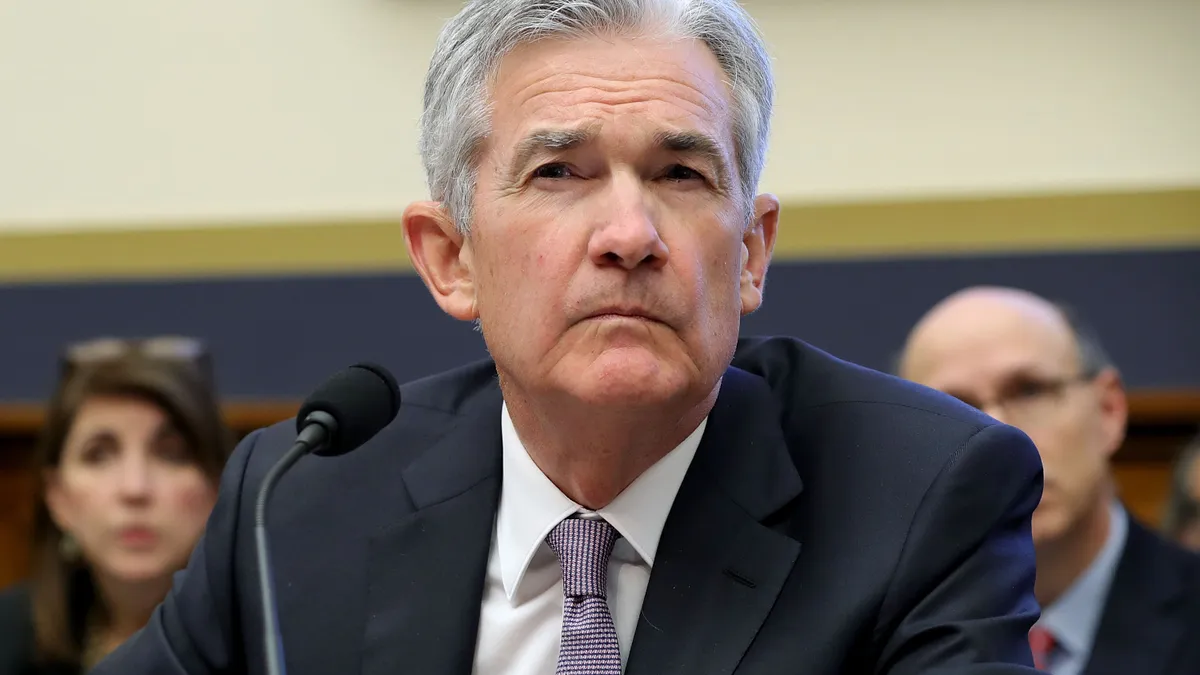Dive Brief:
- Federal Reserve policy makers today affirmed their view that a recent surge in prices is transitory while increasing their forecasts for inflation to 3.4% for this year and 2.1% and 2.2% in 2022 and 2023, respectively. Fed officials in March predicted 2.4% inflation for this year.
-
The central bank said it will continue record stimulus, buying $120 billion in bonds each month and capping the benchmark interest rate at 0.25%. The median projection of policy makers shows that they expect to raise the main rate by late 2023, earlier than their previous forecast in March.
- Inflation “will likely remain elevated in coming months before moderating,” Fed Chair Jerome Powell said at a press conference. As the economy recovers “shifts in demand can be large and rapid and bottlenecks, hiring difficulties and other constraints could continue to limit how quickly supply can adjust, raising the possibility that inflation could turn out to be higher and more persistent than we expect.”
Dive Insight:
The Consumer Price Index rose 5% in May from a year earlier in the biggest inflation gain since August 2008, the Labor Department said last week, following a 4.2% increase for the year ended in April.
CFOs can curb the risk of high inflation by hedging against a falling dollar, selling debt at today’s low interest rates and building inventories at current prices, economists and financial executives said. They may also want to consider moving a portion of their company investment portfolios into gold, Treasury inflation-protected securities (TIPS) and other buffers against rising prices.
Like the Fed, Fitch Ratings sees inflation slowing in the next few years, but from a higher level. “Intense and durable” manufacturing supply chain pressures will push up the Consumer Price Index to 4.1% this year from 1.4% in 2020, Fitch Ratings predicted, while forecasting that the index will fall to 2.2% next year as supply shortages ease.
“Core goods inflation is likely to remain high for several months,” Fitch Ratings said, yet “aggregate wage growth has yet to show signs of rising and this should limit upward pressure on services inflation over the next 18 months.”
Prices have jumped this year in response to a robust recovery and record fiscal and monetary stimulus, including a Fed commitment to indefinitely continue monthly purchases of $80 billion in Treasuries and $40 billion in mortgage bonds.
Consumer spending has picked up as the vaccine rollout continues. The Fed and Biden administration say the inflation flare-up is transitory, fueled by the strong recovery from the pandemic.
Inflation will eventually slow as demand declines and supply rebounds, Powell and other policy makers said. Price gains may be especially high in coming months because of “base effects,” or comparisons with last year's low inflation.
“We’re monitoring inflation very carefully and do take it very seriously — no one wants to return to the bad high inflation days of the 1970s,” Treasury Secretary Janet Yellen said today in a testimony to the Senate Finance Committee.
“I think — this is what most economists think — that the current burst of inflation we’ve seen reflects the difficulties of reopening an economy” that faces bottlenecks and “huge swings in spending patterns,” Yellen said. “I see important transitory influences at work, and I don’t anticipate that it will be permanent.”
Rather than combat inflation, Fed policy makers plan to let it exceed their 2% target to make up for past shortfalls and reduce unemployment, now at 5.8%.
“With inflation having persistently run below 2% we will aim to achieve inflation moderately above 2% for some time so that inflation averages 2% over time and long-term inflation expectations remain well anchored at 2%,” Powell said.
Fitch Ratings predicted “rising prices but not runaway inflation” through 2023 while noting that the impact of U.S. fiscal stimulus this year has “become clearer, including its contribution to the boom in U.S. consumer durables spending, now a staggering 30% higher than pre-pandemic levels.” CPI will likely rise to 2.5% in 2023, Fitch Ratings said.















